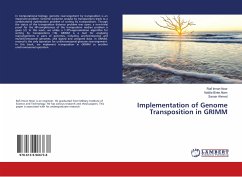
Implementation of Genome Transposition in GRIMM
Versandkostenfrei!
Versandfertig in 6-10 Tagen
27,99 €
inkl. MwSt.

PAYBACK Punkte
14 °P sammeln!
In Computational biology, genome rearrangement by transposition is an important problem. Genome evolution analysis by transpositions leads to a combinatorial optimization problem of sorting by transpositions. Though the status of the transposition distance problem was open, a non-trivial proof for the NP-completeness of the transposition median problem is given [2]. In this work, we utilize a 1.375-approximation algorithm for sorting by transpositions [16]. GRIMM is a tool for analyzing rearrangements in pairs of genomes, including unichromosomal and multichromosomal genomes, and signed and un...
In Computational biology, genome rearrangement by transposition is an important problem. Genome evolution analysis by transpositions leads to a combinatorial optimization problem of sorting by transpositions. Though the status of the transposition distance problem was open, a non-trivial proof for the NP-completeness of the transposition median problem is given [2]. In this work, we utilize a 1.375-approximation algorithm for sorting by transpositions [16]. GRIMM is a tool for analyzing rearrangements in pairs of genomes, including unichromosomal and multichromosomal genomes, and signed and unsigned data. In GRIMM, reversal is the only operation for unichromosomal genome rearrangement. In this book, we implement transposition in GRIMM as another unichromosomal operation.












